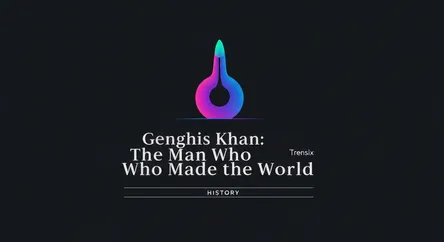History
Genghis Khan: The Man Who Made the World

Discover the story of Genghis Khan, the legendary founder of the largest contiguous empire in history and his enduring impact on the modern world.
What is it?
Genghis Khan, born as Temüjin around 1162, was the founder and first Great Khan of the Mongol Empire. After uniting many of the nomadic tribes of Northeast Asia, he launched a series of military campaigns that established the largest contiguous land empire in history, stretching from Asia to Europe. Renowned for his military genius and innovative tactics, he organized his army based on a meritocracy rather than traditional tribal ties. Beyond his conquests, he implemented significant social and administrative reforms, creating a writing system for the Mongolian language, establishing a legal code, and creating a postal system.
Why is it trending?
Genghis Khan remains a figure of immense historical interest due to his complex and often contradictory legacy. He is remembered both for the brutality of his conquests, which led to widespread destruction and death, and for his remarkable achievements in state-building. His rule initiated a period known as the "Pax Mongolica" or Mongol Peace, which stabilized the Silk Road and fostered unprecedented trade, communication, and cultural exchange between the East and West. Modern scholarship continues to reassess his influence, highlighting how he shaped global history by connecting different cultures and laying the groundwork for the modern world system.
How does it affect people?
The legacy of Genghis Khan has a lasting impact on global culture and demographics. His empire facilitated the spread of technologies like gunpowder, paper, and the compass from East to West. He promoted religious tolerance, a policy that was unusual for his time. Moreover, genetic studies suggest that millions of men worldwide may be direct descendants of Genghis Khan, making his genetic legacy incredibly widespread. His story continues to be a powerful symbol of leadership, nation-building, and the profound historical forces that have shaped contemporary civilizations.